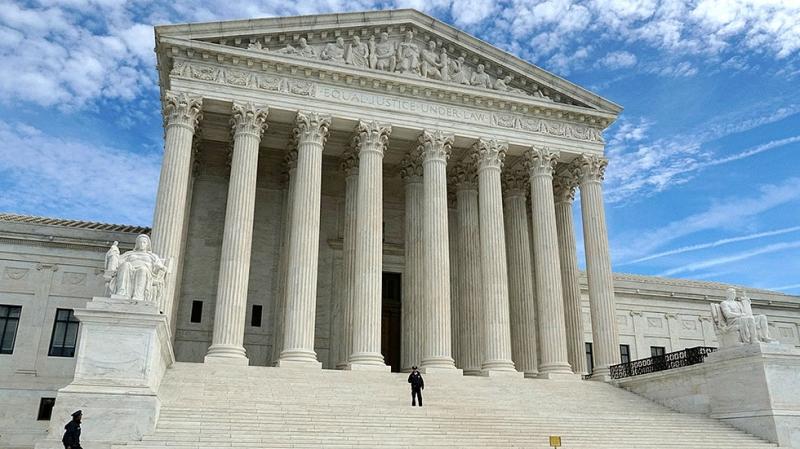US Supreme Court hits a home run for civil rights
Category: News & Politics
Via: texan1211 • 3 years ago • 1 commentsBy: Benjamin F. Chavis Jr. (MSN)



On July 1, the Supreme Court ruled in Americans for Prosperity Foundation v. Bonta the government cannot force nonprofit organizations to disclose the names of their supporters. As a former executive director and CEO of the National Association for the Advancement of Colored People (NAACP) and a statewide youth assistant to Martin Luther King Jr. in the 1960s, I believe this ruling presents one of the most significant wins for civil rights in decades.
© Stefani Reynolds US Supreme Court hits a home run for civil rights
It is important to note that even though the majority conservative Supreme Court has restricted Americans' voting rights, that same highest court in the nation just ruled in favor of protecting the freedom of Americans to support civil rights organizations and other social justice nonprofits.
In taking the side of AFPF, the NAACP Legal Defense and Educational Fund, the Southern Poverty Law Center, and many other nonprofit organizations, the high court invalidated the State of California's mandate requiring tax-exempt charities to release the names of their largest donors. That's good news because the demand is entirely tone-deaf to the American people's freedom to freely associate with outside groups without fear of retribution, which the high court upheld during the civil rights movement.
In 1956, Alabama's attorney general pulled out every legal stop in an attempt to make the NAACP cease operations in the state. Citing the association's activism in the Montgomery bus boycott and financial and legal assistance to African Americans who sought to attend the white-only University of Alabama, the organization was "causing irreparable injury to the property and civil rights of the residents and citizens of the State of Alabama..." He proceeded to issue a subpoena for the names of the association's members.
This subpoena understandably sent shivers down the spines of everyone active in the civil rights movement at the time. The Ku Klux Klan was regularly directing violence against those vocally opposed to segregation, and members of the NAACP were its principal targets. In fact, a state NAACP chapter president's house was bombed, likely by a Klansman, just years before the Alabama attorney general filed his lawsuit. Should the NAACP have surrendered its list of members, it would have presented the association's allies with an untold level of risk. Instead, the group took this issue all the way to the Supreme Court, which ultimately stood up for its members' First and 14th Amendment's right to freedom of association.
In the majority opinion, Justice John Harlan wrote, "Immunity from state scrutiny of petitioner's membership lists is here so related to the right of petitioner's members to pursue their lawful private interests privately and to associate freely with others in doing so as to come within the protection of the Fourteenth Amendment." His opinion also articulated how "Freedom to engage in association for the advancement of beliefs and ideas is an inseparable aspect of the 'liberty' assured by the Due Process Clause of the Fourteenth Amendment."
While the Supreme Court got it right then, the Ninth Circuit Court of Appeals argued in the AFPF case that, "the interests served by disclosure outside the electoral context, such as policing types of charitable fraud, pale in comparison to the crucial importance of ensuring our election system is free from corruption or its appearance."
The Appeals Court's election argument has few legs to stand on. The AFPF case deals not with elections but with the narrow question of whether attorneys general can force 501(c)(3) organizations to disclose their supporters to the state. To categorize this issue as one of campaign finance is entirely disingenuous.
Thankfully, the Supreme Court understands that supporting causes is not the same as supporting candidates. That is why, in its July 1 overturning of the Ninth Circuit's decision, Justice John Roberts wrote that the majority "found little evidence that the Attorney General's investigators relied on Schedule Bs to detect charitable fraud" and "determined that the disclosure regime burdened the associational rights of donors."
The high court deserves praise for yet again defending the rights of Americans who privately support activism efforts of paramount importance to the citizenry's right to life, liberty and the pursuit of happiness. The ruling in AFPF will protect not only civil rights but the causes of every underserved and underrepresented segment of the population that are worth fighting for each day.
I speak for all activists when I say that this is an opinion no one will soon forget.
Dr. Benjamin F. Chavis Jr. is the president and CEO of the National Newspaper Publishers Association (NNPA). He is a former executive director and CEO of the National Association for the Advancement of Colored People (NAACP) and a former assistant to Martin Luther King Jr. and the Southern Christian Leadership Conference (SCLC).

Tags
Who is online
83 visitors

Perhaps this article explains the Court's ruling better for some of our readers.
California should have never passed the law, and its AG's should have known better than to enforce it.